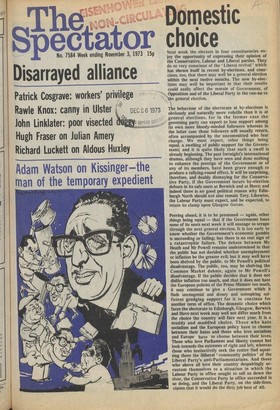Next week the electors in four constituencies enjoy the opportunity
of expressing their opinion of the Conservative, Labour and Liberal parties. They do so very conscious of the ' Liberal revival' which has shown itself in recent by-elections, and conscious, too, that there may well he a general election within the next twelve months. The new by-elections may well be important in that their results could easily affect the morale of Government, of Opposition and of the Liberal Party in the run-up to the general election.
The behaviour of the electorate at by-elections is obviously and naturally more volatile than it is at general elections, for in the former case the governing party can expect to lose support among its own more bloody-minded followers whereas in the latter case those followers will usually return, often accompanied by the uncommitted who fear change. We must expect, other things being equal, a swelling of public support for the Government; and it is quite likely that such a swell is already beginning. The past fortnight's international dramas, although they have seen and done nothing to enhance the prestige of the Government or of any of its members, havi been grave enough to produce a rallying-round effect. It will be surprising, therefore, and doubly dismaying for the Conservative Party, if the Government incurs by-election defeats in its safe seats at Berwick and at Hove; and indeed there is no good political reason why Edinburgh North should not also remain Tory. Likewise, the Labour Party must expect, and be expected, to retain its clamp upon Glasgow Govan.
Peering ahead, it is to be presumed — again, other things being equal — that if the Government loses none of its seats next week it will manage to scrape through the next general election It is too early to know whether the Government's economic gamble is succeeding or failing; but there is no real sign of a catastrophic failure. The debate between Mr Heath and Mr Powell remains undetermined in that the public has not decided whether unemployment or inflation be the greater evil; but it may well have been shelved by the public, to Mr Powell's political disadvantage. The public, too, may be shelving the Common Market debate, again to Mr Powell's disadvantage. lithe public decides that it does not dislike inflation too much, and that it does not hate the European policies of the Prime Minister too much, it may continue to give a Government which it finds uncongenial and dreary and uninspiring sufficient grudging support for it to continue for another term of office. The domestic choice which faces the electorate in Edinburgh, Glasgow, Berwick and Hove next week may well not differ much from the choice the country will face next year. It is a muddy and muddled choice. Those who hate socialism and the European policy have to choose between their hates and those who love socialism and Europe have to choose between their loves. Those who love Parliament and liberty cannot but look towards the extremes of right and left, whereas those who instinctively seek the centre find squatting there the illiberal community politics' of the Liberal Party's anti-Parliamentarians. And those who above all love their country despairingly accustom themselves to a situation in which the Labour Party in office sought to sell us down the river, the Conservative Party in office succeeded in so doing, and the Liberal Party, on the side-lines, claims that it would do the dirty job best of all.


































